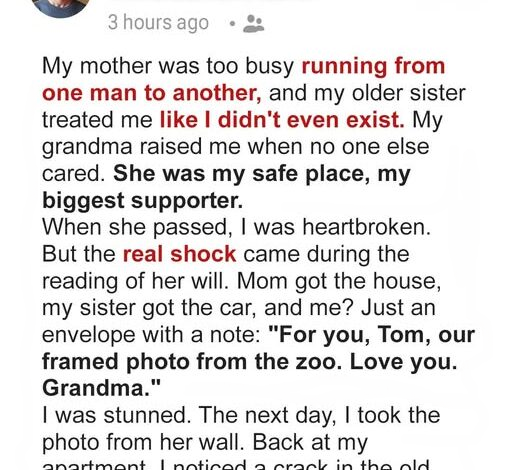When my grandmother Grace passed, I expected little — but I didn’t expect nothing.
At the will reading, my mother and sister claimed what they’d long circled. Mom took the house she’d coveted. Cynthia took the car she’d practically lived in. When the lawyer turned to me, I braced for something small — a ring, maybe a trinket. Instead, he handed me a single, neatly wrapped parcel. Inside was a photo: Grandma and me at the zoo when I was six. Crooked pigtails, her hand in mine, a giraffe bowing its neck as if to us.
That was it. No keys. No numbers. Just a picture.
I drove home embarrassed and angry, the kind of quiet fury that tightens your throat. I placed the frame on the kitchen table and told myself what I’d always suspected — that I’d been the forgettable one, the good kid no one noticed.
The frame had a small crack. Out of habit, I pried open the back. An envelope slipped out, yellowed and sealed with floral tape from her sewing kit. Inside were stock certificates, old bank statements, a handwritten note, and a tiny brass key. Beneath it: three words, “For when you’re ready.”
The next morning, key in hand, I went to the bank. A clerk led me to a vault and placed a small safe-deposit box on the table. I turned the key and lifted the lid. Inside: deeds to rental properties I didn’t know she owned, a ledger of dividends, and at the bottom, the deed to the land under the house my mother thought she’d inherited.
I sat there, trembling, and cried. It wasn’t just money — it was direction. She hadn’t forgotten me. She’d trusted me.
I bought back the house, restored it, painted the door Grace’s favorite green, turned the parlor into a lending library, the dining room into a soup-and-bread kitchen. I hung a brass plaque on the stoop: Grace’s Corner.
Word spread. Kids came first, shy but hungry for books and snacks. Parents followed, drawn by curiosity and the smell of bread. No one paid or explained themselves. You left lighter than you arrived.
The first winter night, I set two mugs on the counter — one for me, one for her. It became a ritual.
Months later, Cynthia showed up. Eyes hollow, mascara smudged. She didn’t ask for money — just to sit. I poured her coffee and let her talk. When she finished, I slid an apron across the table. “If you stay, you stay because you’re useful. Be someone Grandma would point at and smile.” She took it.
The next morning, she showed up at seven, hair tied back, sleeves rolled, scrubbing pots, ladling soup, smiling at strangers. “I forgot what it felt like to belong,” she whispered at closing.
That night, I sat in Grandma’s chair, looking at the zoo photo. Then it clicked: it wasn’t a gift. It was a message.
Grace hadn’t left me inheritance to hoard — she’d left me something to use, something to build with. Her photo wasn’t a token; it was a blueprint.
Now, every corner hums with her. The bell over the door laughs when someone new walks in. Kids argue over comics. Stew simmers in the kitchen. People remember what community feels like.
My mother eventually joined, at first politely, then staying to help. We never spoke of the will again. We just served soup and stories, quietly repairing what was broken.
People ask what Grandma left me. I tell them: everything.
At first, it looked like a cracked frame, a moment of disappointment. But inside, it was full — full of faith, trust, and the kind of love that hands you direction, not comfort.
Grace’s Corner isn’t just a building. It’s her heartbeat — every kid with soup on their chin, every old man leaving smiling, every paperback borrowed and returned.
Some nights, after everyone’s gone, I hold the photo to the window. The light catches the glass, and for a moment, I swear I see movement — a sleeve, a smile, the faint scent of Ivory soap. And I imagine her saying what she always did: “You’re exactly where you’re supposed to be, sweetheart.”
All she left me was love. And that was more than enough to build a life.
